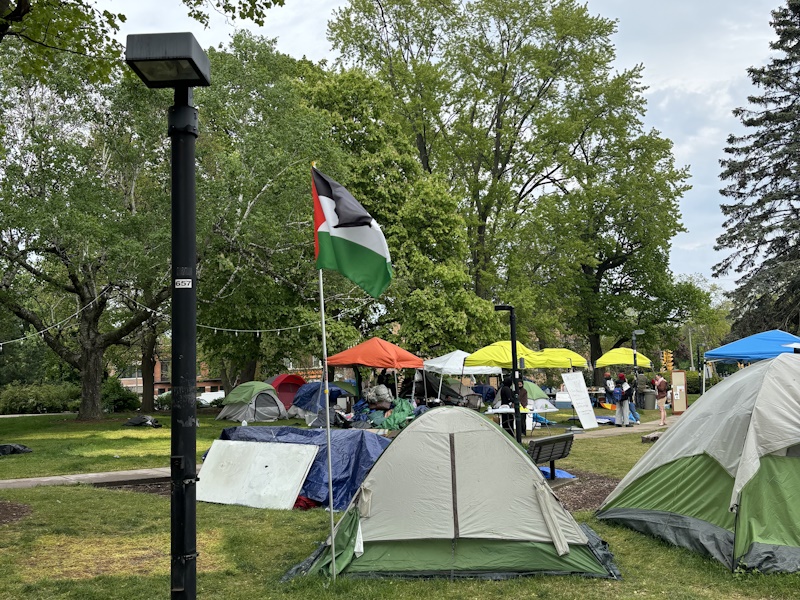UWM Skillfully Handles Student Protests
Chancellor Mone avoids police crackdown, meets and treats students with respect.
Across the nation, many college campuses have cracked down on student protests of the Israeli attacks on Gaza. Some 50 universities have called on the law enforcement authorities to intervene and 2,800 people have been arrested or detained on campuses across the country. Students and faculty have been beaten, tear gassed, and shot at with rubber bullets by police.
At the University of Virginia, in Charlottesville, state police officers in riot gear carrying M4 carbines and chemical-gas launchers were called in to disperse a small group of student protestors with a handful of tents. At Dartmouth, police wearing riot gear grabbed Annelise Orleck, the 65-year-old historian and former chair of Jewish studies, slammed her to the ground and arrested her. At the University of Texas at Austin, officers in riot gear marched into campus on horses. At Indiana University, state police snipers were positioned on the roofs of campus buildings.
And at UW-Madison, police swarmed a student encampment and arrested 34 people. Universities of Wisconsin President Jay Rothman offered only tough talk and threats of police to the protestors.
Talk about an over-reaction by the university leaders. These are students at their university, who are paying huge amounts of tuition and are trying to express themselves on an important issue of the day, and they are being treated like criminals. It is the chancellors who should be taking the high ground, understanding that these are young, barely adult students who want to express their ideals. At Brown University, its leaders seemed to realize this, and acted like the adults in the dispute, treating the students with respect and agreeing to meet and discuss their demands that the university divest from investments related to the Israeli economy.
Yet most universities decided instead to get tough on the protestors. As UW-Milwaukee chancellor Mark Mone noted in a statement about its settlement with student protestors, “many have criticized UWM for not forcing the removal of the camp earlier. Indeed, the most common question asked of us involved when police would be sent in to break up the encampment. Our consistent answer: UWM leadership prioritized the safety of everyone involved, which meant seeking resolution through dialogue with our students.”
The encampment at UWM was created two weeks ago, on April 29, with about 40 tents surrounded by tables set up as a perimeter. Not only did Mone avoid calling in Milwaukee police (or state police as some universities did), he also instructed UWM campus police to use restraint. Leaders of the student protests ultimately thanked the UWM Police Department for the respect its officers showed students.
That restraint, and the willingness of university officials to meet with student leaders (at least three times in the last week alone) may have helped head off any students attempting to take over a university building, which happened at a number of universities across the country. Still, the student leaders deserve praise for responding so constructively.
The May 12 statement by UWM outlining the proposed settlement of the protests, and which the student group, UWM Popular University for Palestine Coalition, ultimately signed, is a model of smart leadership.
One excerpt shows just how seriously Mone took the student protests. Students raised concerns about the The Water Council, the Milwaukee group where Mone serves as board member and treasurer, having relationships with two Israeli-government-owned water companies. In fact it was determined that the council had such relationships with Mekorot and Israel Innovation Authority, two companies “accused by international aid organizations, including Amnesty International, of cutting off access to drinking water for thousands of Palestinians in Gaza, exacerbating water scarcity,” the May 12 UWM statement noted. “At the Chancellor’s urging, the Water Council no longer has relationships with these entities, and they have been removed from the global listing on the Water Council’s website.”
The statement by UWM was remarkably nuanced in addressing the Israel-Hamas conflict. Officials agreed to join the call for a ceasefire in Gaza, condemning genocide while noting that “As of this letter, the UN had reported more than 34,000 innocent Palestinians, approximately 60% of whom were women, children and the elderly, had been killed, and nearly 80,000 more had been injured in the war on Gaza.”
We also condemn the attack by Hamas on October 7, 2023, resulting in the killing of 1,200 innocent Israeli civilians, military personnel and police.”
UWM’s statement also noted that “more than 5,479 students, 261 teachers and 95 university professors have been killed in Gaza, and over 7,819 students and 756 teachers have been injured… “At least 60 percent of educational facilities, including 13 public libraries, have been damaged or destroyed and at least 625,000 students have no access to education… As educators and education administrators, we believe protecting our schools is fundamental to society. We condemn the destruction of the education system.”
Besides the decision to address student concerns about The Water Council, Mone and UW also offered to have the UWM Foundation leadership meet with four members of the student protestors who “will be given the opportunity to express their requests for disclosure and divestment. This offer is in addition to the UWM Foundation financial statements provided to you, as well as our information about UWM’s request to the Foundation Board to review its investments in funds that include weapons manufacturers.”
In return for this, student protestors agreed to take down their encampment and not to disrupt either of UWM’s commencement ceremonies. “We believe that our encampment was successful due to the coordinated efforts of an entire community composed of many religions, races and ethnicities,” a statement by the UWM Popular University for Palestine Coalition declared. “After hard fought edits [of the agreement with UWM] and careful consideration by the coalition, we determined that we had obtained all possible benefits from our encampment. This does not mean that we have ended our struggle.”
This was a teaching moment for UWM and its leadership. The encampment on the lawn outside of Mitchell Hall “tests us in ways not seen in generations and reminds us that such tests rarely come with one-size-fits-all answers,” Mone declared in a May 8 statement to students, faculty and staff. Ultimately Mone and his administration passed that test, handling the protests as educators rather than mindless authoritarians calling for a crackdown.
Update May 15: Stacy Vogel Davis, Communications Director for The Water Council, contacted Urban Milwaukee to contest UWM’s description of the council’s connection to Israeli companies, sharing the council’s statement, which says “The Water Council disagrees with the characterization that it has recently ended relationships with Mekorot and Israel Innovation Authority as there has been no activity with these organizations since 2019 and they were never members of The Water Council.” The statement also says that “For many years, in pursuit of our mission, The Water Council has shared an open dialogue with water-related organizations around the world in the interest of improving water quality and quantity outcomes for all… This open dialogue has included Israeli water technology organizations, including Mekorot, Israel Innovation Authority and Ben-Gurion University, in the interest of sharing innovations and discovering new water technologies.”
If you think stories like this are important, become a member of Urban Milwaukee and help support real, independent journalism. Plus you get some cool added benefits.
Murphy's Law
-
The Last Paycheck of Don Smiley
 Dec 17th, 2025 by Bruce Murphy
Dec 17th, 2025 by Bruce Murphy
-
Top Health Care Exec Paid $25.7 Million
 Dec 16th, 2025 by Bruce Murphy
Dec 16th, 2025 by Bruce Murphy
-
Milwaukee Mayor’s Power in Decline?
 Dec 10th, 2025 by Bruce Murphy
Dec 10th, 2025 by Bruce Murphy






















Bravo UWM!
Exactly the way the protests should have been handled.
I would like to read about the 1948 treaty that established Israel. I have always thought some provision was made for Palestine, but apparently I am wrong.
Any suggestions for a balanced history of the period?
Sounds like a model for leadership at universities. Students responded
From 2014:
Genesis: Truman, American Jews, and the Origins of the Arab/Israeli Conflict by John Judis
Hats off to all who worked to make this public protest both safe and effective. Big raised fist to the caring, orderly students who stood up for Palestine! Hats off to the UWM administration for its sensible response to the event- Chancellor Mone showed real leadership, unlike that stooge in Madison. As an alum who participated in many demonstrations and political actions during my time as a student- and who also eventually joined the faculty of UWM- I am proud of how our campus handled this heartfelt demonstration of love and international solidarity. The 1st amendment lives in Pantherland. “The kids are alright!”